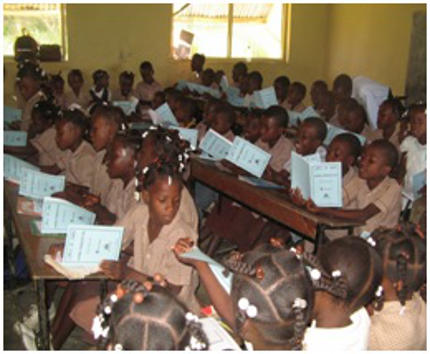 Haiti
Haiti
Languages
Creole and French literacy
The Jacmel Field Office will join our Lekti se Lavni/Lire c’est L’avenir program, an innovative Creole and French literacy program that is founded on the principle that children are able to develop reading skills more easily and quickly in their native language. Our West Department and Dessalines teams are already supporting schools to use this approach. Save the Children was one of the first organizations in Haiti to address the lack of language and literacy ability among early grade students through an innovative Creole literacy program called Lekti se Lavni (reading is the future). SC’s a major achievement in 2012 was the expansion of this literacy program and the design of two new components:
- Development of materials for a French literacy program for 1st and 2nd grade students called Lire c’est l’avenir.
- Development of Ti Bourad pou plezi de li, an out-of-school reading program facilitated by parents and community volunteers.

This expanded literacy program contributes to the GI breakthrough on reading; it is also through this program that SCI’s theory of change is being implemented in the education sector in Haiti. Early reading mastery in French and Creole is a priority of the Ministry of Education (MENFP). Lekti se Lavni and similar programs adapted from it are implemented by the IRC, Concern Worldwide, and USAID. Education-focused organizations are also mobilized in a platform to bring the government’s reading goals at scale. Save the Children has started the procedure to second a national coordinator for an early reading program position at the MENFP.
Save the Children supported its partner Quality Education Initiative (QEI) schools to establish student-led groups called student committees. In every classroom, students elected two representatives from each class to represent them on the student committee. The student committee representatives then participate in activities of the noyau communautaire (a core group for creating wide-spread community buy-in to program activities and increasing sustainability). A key activity of the noyau communautaire is the organizing and implementing of community-led school improvement projects. Student inclusion within this group encourages that children have a voice in selecting what activities will be carried out to improve their schools. In 2012, the Haiti Country Office directly reached 79,669 children and 26,430 adults with its education-related programming.